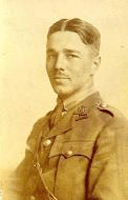 |
| Wilfred Owen, poet of "Anthem for a Doomed Youth". |
Recently as part of this unit, I have begun to delve a little bit deeper into the history of the writer of the poem I have chosen for this poem; Wilfred Owen. There are several useful websites I found with a wealth of information on the poet in question, but the site I found most useful in my research process was http://www.wilfredowen.org.uk/home/
This site has information on Owen's personal life and enlightened me on a few facts about his journey to becoming "one of the greatest voices of the first world war." Owen was apparently always determined to become a poet- even from a young age and worked as a teacher in France before joining the British Army in 1917.
I found the fact that Owen was involved in the army and experienced the first world war first hand to be very interesting, and adds a sense of legitimacy to his war poems. For example, if I myself were to write a war poem, it would lack credibility and realism, since I have no experience of being on a battlefield at all. Wilfred Owen however has obviously experienced the horror of war and this is reflected brilliantly in his poem I have chosen to adapt; "Anthem for a Doomed Youth."
I also find it very interesting that Owen apparently suffered from shellshock during his time in the British Army, and the timing of said shellshock works out to have taken place around the time he wrote "Anthem for a Doomed Youth."
After reading Anthem for a doomed youth, and after discovering that Wilfred Owen's particular style of writing wasn't truly honed until around 1917, I decided to check out some of his other pieces of writing, and came across one called "Dulce Et Decorum Est".
Link to Poem.
Dulce Et Decorum Est seems like a much darker poem than "Anthem for a Doomed Youth". Two particular descriptive lines from it:
If you could hear, at every jolt, the blood
Come gargling from the froth-corrupted lungs
In comparison to "Anthem for a Doomed Youth", this poem is a lot gorier in the way that it actually describes a person dying in a horrifically brutal way, drowning in their own blood due to not being able to put on a gas mask on time. In the current day where a lot of this poems readers would probably have never experienced World War One, this poem would come across as quite shocking. I find it to be quite an interesting read though, and reflects the kind of conditions Wilfred Owen must have seen every day in the trenches as part of his war service.
I also discovered during my research that Wilfred Owen was a fan of Siegfried Sassoon, the writer of another poem I had the option to adapt; "The Death Bed." I tried not to sway my research too much away from Wilfred Owen and into Siegfried Sassoon for the sake of this project, but out of interest, I decided to read and analyze The Death Bed (which was written before Anthem for a Doomed Youth) to see if it's style of writing was in any way similar to Wilfred Owen's, in the hopes that perhaps I could find some similarities and if Siegfried Sassoon could have inspired Owen in any way.
I was surprised to find however that "The Death Bed" and "Anthem for a Doomed Youth" are two very different poems with two very particular styles of writing. The Death Bed tells the story of one particular character who is wounded and slowly dying. The atmosphere and surroundings are detailed brilliantly, as is the atmosphere and surroundings in "Anthem for a Doomed Youth", but Owen's poem lacks a specific character, and instead focuses on describing the horrors of war as a whole, without placing a person into the mix.
There are two ways of looking at this in my eyes. The first is that Siegfried Sassoon's poem would be easier to adapt and relate to as a specific character is introduced and the reader/viewer can put themselves in that character's shoes. The second is that Wilfred Owen's poem would be easier to adapt as it doesn't feature any one character, and is instead a very broad description of the war as a whole, mostly describing the sounds and sensations every soldier would experience in the trenches.
I will continue my research on the subject by visiting the library at UCA Rochester and reading some of the books we have been suggested on this unit's reading lists. I will also be sure to investigate the life of Wilfred Owen some more and find out what other war poets may have inspired his work.

No comments:
Post a Comment